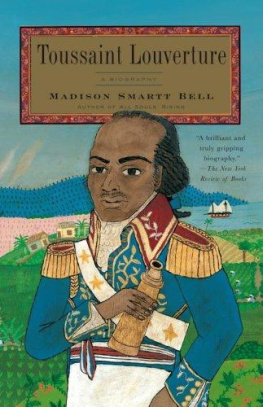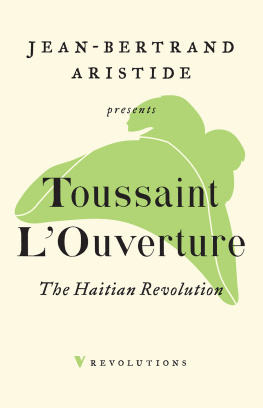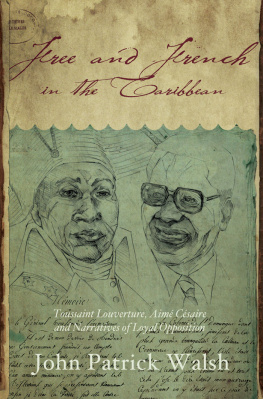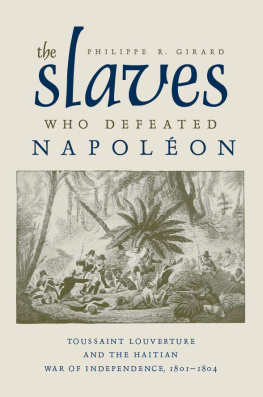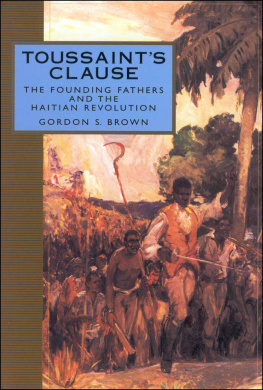

Table of Contents
Most special thanks to Jane Gelfman, Cork Smith,Dan Frank, Lisa Hamilton, and Altie Karper for arduous,painstaking work on the manuscript, and to Bill Buford andSonny Mehta for taking the chance when the risk was high.
Sometimes, if you let a man live,he is less dangerousthan if you kill him.If you kill him,You will never be rid of him.
Jean-Bertrand Aristide as quoted by Amy Wilentz in The Rainy Season
ACCLAIM FOR Madison Smartt Bells
MASTER of the CROSSROADS
A stunning achievement: marvelously crafted, meticulous in its historical detail, magnificent in its sweep.The Seattle Times
[A] rich novel.... Its huge tapestry of scenes on battlefields and plantations, in ranches and churches, vibrantly reanimates Bells cast of real and fictional characters.... [Toussaint] is now one of the great characters in modern literature.San Francisco Chronicle
An absorbing and... majestic read.... [Bell] could not have chosen a more resonant setting than Haiti, nor found a more telling figure in whom to summon contemporary hopes and fears.Chicago Tribune
This meticulously researched novel has the feel of a tableau by Delacroix: a generous swirl of individual and collective fervor.The New Yorker
A fascinating tale.... Bell rides his near-perfect prose style through the terrain of the human psyche with astonishing ease.The Philadelphia Inquirer
Bell has learned well the lessons of [Tolstoy].... [The] human drama of families, lovers and individual quests for self-knowledge envelops the reader in a brilliant blend of history and fiction. The Oregonian
Atmospheric, well-researched, and well-written.... The unfolding of Haitian history is a fascinating tale, and Bell tells it with great skill.Pittsburgh Post-Gazette
Provides a history lesson that tells us much about our present and, perhaps, constitutes a warning for our future.The Miami Herald
Read this novel to get a feel of life and death in the midst of one of the New Worlds major political and military uprisings... in this trilogy we find the talented Madison Smartt Bell at the crossroads of his career.The Dallas Morning News
FOR PRE ANTOINE ADRIEN, WHO HAS OFFERED HIS LIFE TO THIS HISTORY
Michel-Rolph Trouillot, Ll Beaubrun, Guidel Prsum, Jean de la Fontaine, Alex Roshuk, Gesner Pierre, Monique Clesca, Lyonel Trouillot, Sabine Sannon, Rodney Saint-Eloi, Ephle Milc, Carmen, Eddie Lubin, Mimerose Beaubrun, Russell Banks, Anne-Carinne Trouillot, Edwidge Danticat, Patrick Delatour, Gabrielle Saint-Eloi, Meg Roggansack, Richard Morse, Michelle Karshan, Evelyne Trouillot-Mnard, Georges Castera, Yannick Lahens, Gary Victor, Philippe Manass, Claudette Edoissaint, Joel Turenne, Yves Colon, Anna Wardenberg, Benoit Clment Junior, Bob Shacochis, Edouard Duval-Carri, Patrick Vilaire, C. S. Godshalk, Pre Max Dominique, Pre William Smarth, Judith Thorne, Bernard thart, Bryant Freeman, Ken Maki, Didier Dominique, Rachel Beauvoir, Max Beauvoir, Robert and Tania Beckham, Dr. Laurent Pierre-Phillipe, Marie Racine, Stephane DAmours, Robert Corbett and all citizens of Corbettland too numerous to mention, Amy Beeder, Hrald Prard, Ferry Pierre-Charles, Josette Prard, Kati Maternowska, Elizabeth McAlister, Max Blanchet, Kathy Grey, Faubert Pierre, Marc Christophe, Laetitia Schutt, Bruce Hoverman, Joel Dreyfuss, Nancy Mnard, Garry Pierre-Pierre, Paul Ven, Alyx Kellington, Amy Wilentz, Nina Schnall, Guy Antoine, Daniel Simidor, Beverly Knight Sullivan, Richard Edson, Uriode Orelien, Baba, RoseMarie Chierici, Gerard Barthelmy, Fritz Daguillard, Robert Stone, les jeunes braves du Cap including but not limited to Martinire, Saint-Jean, Andy, Tidjo, moun ki mt nan MorneCalvaire, you whose names I have not mentioned, you who helped me at the crossroads whose names I never knew,
Youn sl nou pdi,
Ansanm na rive.
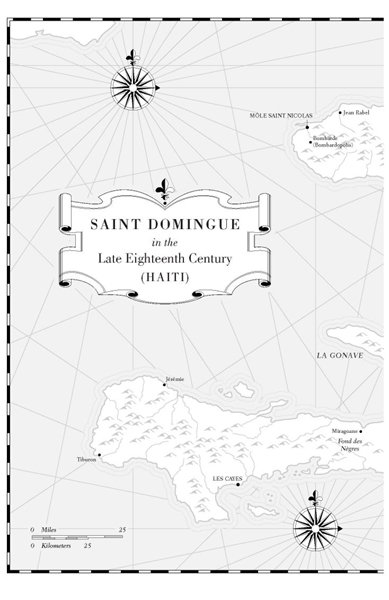
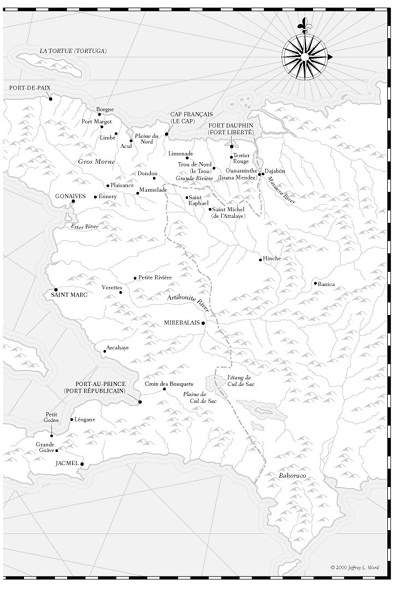
Fort de Joux, France August 1802
Citizen Baille, commandant of the Fort de Joux, crossed the courtyard of the mountain fortress, climbed a set of twelve steps, and knocked on the outer door of the guardhouse. When there was no reply, he hitched up the basket he carried over his left arm and rapped again more smartly with his right fist. A sentry opened to him, stood aside, and held his salute. Baille acknowledged him, then turned and locked the door with his own hand.
Les clefs, said Baille, and the sentry presented him with a large iron keyring.
In the future, Baille announced, I will keep these keys in my own possession. Whoever has need of them must come to me. But there will be no need.
Citizen Baille unlocked the inner door and pulled, heaving a part of his considerable weight against the pull-ring to set the heavy door turning on its hinges. He stooped and picked up a sack of clothing from the floor, and carrying both sack and basket, passed through the doorway and turned and locked it behind him.
The vaulted corridor was dimly lit through narrow loopholes that penetrated the twelve-foot stone walls. Baille walked the length of it, aware of the echo of his footfalls. At the far end he set down the basket and the sack and unlocked another door, passed through, and relocked it after him.
Two steps down brought him to the floor of the second vaulted corridor, which was six inches deep in the water that came imperceptibly, ceaselessly seeping from the raw face of the wall to the leftthe living stone of the mountain. Baille muttered under his breath as he traversed the vault; his trousers were bloused into his boots, which had been freshly waxed but still leaked around the seams of the uppers. Opening the next door was an awkward affair, for Baille must balance the sack and basket as he worked the key; there was no place on the flooded floor to lay them down.
Ordinarily he might have brought a soldier or a junior officer to bear those burdens for him, but the situation was not ordinary, and Baille was afraidno (he stopped himself), he was not afraid, but... He could not rid his mind of the two officers of the Vende who had lately escaped from this place. It was an embarrassment, a scandal, a disgrace, and Baille might well have lost his command, he thought, except that to be relieved of this miserable, frozen, isolated post might almost have been taken as a reward rather than a punishment. He still had little notion how the escape had been possible. There was none among his officers or men whom he distrusted, and yet none could give a satisfactory explanation of what had taken place. The prisoners could not have slipped through the keyholes or melted into the massive stone walls, and the heavy mesh which covered the cell windows (beyond their bars) was not wide enough to pass a grown mans finger.
His current prisoner was vastly more important than those officers could ever dream to bealthough he was a Negro, and a slave. From halfway around the world Captain-General Leclerc had written to his brother-in-law, the First Consul, Napoleon Bonaparte himself, that this man had so inflamed the rebel slaves of Saint Domingue that the merest hint of his return there would overthrow all the progress Leclerc and his army had made toward the suppression of the revolt and the restoration of slavery. Perhaps only the whisper of the name of Bailles prisoner on the lips of the blacks of Saint Domingue would be sufficient cause for that Jewel of the Antilles, so recently Frances richest possession overseas, to be purged yet another time with fire and blood. So wrote the Captain-General to his brother-in-law, and it seemed that the First Consul himself took the liveliest interest in the situation, reinforcing with his direct order Leclercs nervous request that the prisoner be kept in the straitest possible security, and as far away as possible from any seaport that might provide a route for his return.
Next page

